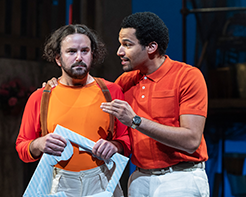The Comedy of Errors
Pair of Deuces, 3 of Hearts = a Winning Hand
Shakespeare Theatre Company, Klein Theater, Washington, D.C.
Friday, September 13, 2024, L–2 (Stalls, right aisle)
Directed by Simon Godwin
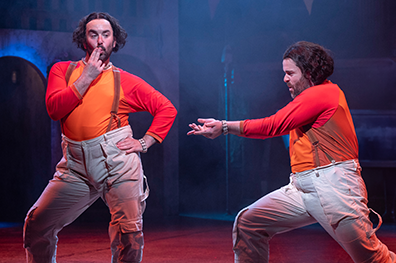
Dromio of Syracuse (Alex Brightman, left) and Dromio of Ephesus (David Fynn) launch into the finale dance number in the Shakespeare Theatre Company's production of William Shakespeare's Comedy of Errors at the Klein Theatre in Washington, D.C. Photo by Teresa Castracane Photography.
Let's start at the end. Dromio prances onto the stage and launches into a high-kicking, body-twisting, hand-raising, disco-flavored song and dance. They are soon joined by the entire cast for a full-on dance number—part encore, part curtain call—to conclude the Shakespeare Theatre Company's production of William Shakespeare's The Comedy of Errors. The audience's instant standing ovation is fully deserved.
Foremost in my mind watching this finale, however, is not the great production values of the show I'd just experienced, or the succinctly subtle acting choices across the talented ensemble, or the out-of-nowhere humor working in tandem with on-target Shakespearean verse readings. What I'm thinking is how the heck are Alex Brightman and David Fynn as, respectively, Dromio of Syracuse and Dromio of Ephesus still standing, let alone singing while dancing, given what they've accomplished physically and endured choreographically over the past 2:10 hour's traffic on the stage with only a 15-minute rest for intermission?
This is Dromio's play, and, yes, Dromio is essentially one character split in two as played by Brightman, a Broadway veteran (Tony Award nominations for Beetlejuice and School of Rock), and Fynn, a London National Theatre and West End veteran (Olivier nomination for School of Rock). Nevertheless, this Simon Godwin-helmed production is as solid an ensemble piece as I've seen anywhere, albeit unusual for the hitherto one-actor-one-part, caste-oriented casting practices of the Shakespeare Theatre Company.
This Comedy of Errors continues a string of success for Godwin in his tenure as the company's artistic director since 2018 (his first two seasons were wiped out by the Covid pandemic). I'm measuring that success in Shakespearean terms as well as critical acclaim and box office returns, including The Comedy of Errors now extended, twice, to October 20. Godwin certainly can not be called a Shakespearean purist. Exhibit A was his 2022 Much Ado About Nothing set in a television newsroom. Gimmicky though it was, it was Shakespearean gimmickry (newscasts, sports reports, and even the weather were drawn from Shakespeare's other plays). His trimmed-down King Lear in 2023 lost its epic scale but gained the most insightful portrayal of dementia I've ever seen in Patrick Page's interpretation of Shakespeare's title character.
In some ways Godwin is more respectful of Shakespeare's products than most purists are. Shakespeare wrote for the theater, a venue for entertainment not artistic snobbery. With Godwin's long experience in England's grand slam of Shakespeare practitioning companies—the Royal Shakespeare Company, the National Theatre, the Royal Court Theatre, and the Bristol Old Vic—he brings a honed, British classical theater sensibility to D.C.'s Shakespeare Theatre Company. That sensibility eschews taking the plays or himself too seriously a;nd instead focusing on entertaining audiences. It's clear from the Folio and Quarto texts that Shakespeare abided by that same principle (Troilus and Cressida notwithstanding). Even last season's Godwin-helmed Macbeth, with Ralph Fiennes in the title role, had bits of camp humor along with arresting drama and searing tragedy. Last fall Godwin also extended such sensibility with his first foray into opera, directing Charles Gounod's Romeo and Juliet for the Washington National Opera, blending the characters' youthful exuberance with soaring arias.
While Godwin mingles much modern matter into Shakespeare's texts, he largely adheres to Shakespeare's verse form and finds poignancy in particularly key places. One such moment in The Comedy of Errors comes when Antipholus of Ephesus (Ralph Adriel Johnson) physically lays into his Dromio (Fynn) in yet another fit of anger. In the middle of the violent mayhem, Dromio says this:
I have served him from the hour of my nativity to this instant, and have nothing at his hands for my service but blows. When I am cold, he heats me with beating; when I am warm, he cools me with beating; I am waked with it when I sleep; raised with it when I sit; driven out of doors with it when I go from home; welcomed home with it when I return.
(This production cuts the last three lines of this speech.)
In two dozen other productions I've seen of this play, comic stage business subsumes Dromio's speech, or the passage is excised altogether. Godwin gives it space. As the Officer (Camilo Linares) holds Antipholus back, Fynn's emotionally spent Dromio sits at a café table and speaks the speech with heart-rending seriousness. He lands on "welcomed home with it when I return" in the manner of a long-abused familial partner.
Then there is the matter of Adriana, the Ephesian Antipholus's long-suffering wife putting up with his philandering ways. A hard role to capture with sincerity, Adriana is more easily played over the top because the comedy suffers if you take her too seriously. Shayvawn Webster portrays Adriana as an ever-at-the-end-of-her-fuse firecracker who erupts in a scathing, out-of-her mind rant when she describes her husband as "deformed, crooked, old and sere, ill-faced, worse bodied, shapeless everywhere (pointing both fingers at her crotch to illustrate her meaning of everywhere), vicious, ungentle, foolish, blunt, unkind, stigmatical in making, worse in mind."
"Who would be jealous then of such a one?" her sister, Luciana (Cloteal L. Horne) rightly asks. Adriana responds:
Ah, but I think him better than I say,
And yet would herein others' eyes were worse.
Far from her nest the lapwing cries away:
My heart prays for him, though my tongue do curse.
Webster delivers this passage with honest art, masterfully using the verse to present a too-smitten heart.
Godwin also tears down the fortress fourth wall that the Shakespeare Theatre Company maintained over the years. His productions include the characters—not the actors—directly addressing members of the audience instead of staring at the exit signs beyond. In this production, the characters even touch members of the audience. In addition to Dromio of Ephesus searching for Antipholus amid the audience and Dromio of Syracuse describing the kitchen wench, "a very beastly creature," in the face of a man in the front row, that same Dromio pulls a strand of a woman's hair when he describes devils asking people for certain body parts, including "a hair." One of the Dromios—my notes don't make clear which—recites an entire speech while holding the hand of a woman in the front row (in a preview performance, he took a man's program and pretended to read the speech from it). If you are going to sit in the front row of this production, be prepared to be a prop.
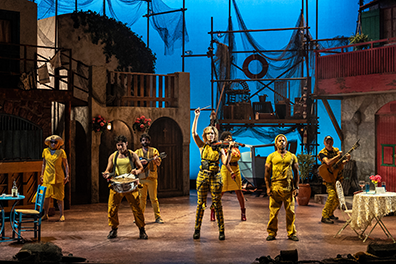
Cast musicians perform on the Ephesus set designed by Ceci Calf in the Shakespeare Theatre Company's production of William Shakespeare's The Comedy of Errors. From left are Amanda Naughton, Camilo Linares, Jacob Brandt, Pearl Rhein, Kimberly Dodson, Ro Boddie, and Eric Hissom. Photo by Teresa Castracane Photography.
Another Godwin trademark: detailed sets. Scenic Designer Ceci Calf has built a Mediterranean fishing port down to the apron wall serving as a sea wall of stone and moss. Stage right is a seafood shop with trays of fish, large clams, and either abalones or huge scallops, and whole octopi hanging on racks and draped over the railing (octopus is a weapon of choice in the Act Five chase scene). Ringing the stage are the café with the courtesan's apartment above; an archway; the double-door (small door within a larger door) abbey; a boat-building shop with a boat constructed over the course of the play; and the Phoenix, the double-door (side-by-side) home of Antipholus and Adriana. Lots of doors is essential for effective staging of The Comedy of Errors with the comings and goings and comings again of two sets of same-named identical twins. Stage left has a cupola with a bell (this production begins alarmingly, so beware), and underneath that and the seafood shop hang orange lifebuoys. Fishing nets hang above the stage, and their source, The Nautical Place, gets credit in the program.
Costume Designer Alejo Vietti dresses the cast in modern garb with a decided taste for a spectrum of yellow and orange. The merchant class are in cocktail party garb while the artist class are eclectic fringe, such as Angela the Jeweler (Pearl Rhein) in a leopard-spotted jacket over yellow t-shirt with black abstract patterns and yellow plaid pants with chains hanging from her belt and across her thighs. Egeon (Timothy D. Stickney), the Antophili's father, wears a knee-length dark orange smock while the Duke (Eric Hissom) and the officer are in lighter orange military uniforms, establishing an artificial cultural as well as economic policy divide between Syracuse and Ephesus, respectively. The two Dromios wear multshade orange sweatshirts and white cargo pants with suspenders while the two Antipholi are in white leisure suits, including white shoes, and orange polo shirts.
Stacey Derosier's lighting design is effectively moody and effervescently sunny as necessary. It gets its own gag when Dromio moves across the stage to give an aside and has to direct the spotlight to catch up with him (I wonder if this was a mistake in preview the team left in as yet another fun meta-theater moment).
And a shout-out to Fight Choreographer Robb Hunter: I've never seen a fight using long oars before, let alone one so excitingly exact between Christian Thompson's Antipholus of Syracuse and Ro Boddie's Balthasar the merchant. That fight ends with Brightman's Dromio of Syracuse stomping on Balthasar's foot, thus allowing Dromio and his master to escape. As the Ephesian populace chase after them, Boddie brings up the rear, hobbling up one Klein auditorium stairway aisles and down the other. He maintains this painful-to-watch but inevitably hilarious hobble for the rest of the play.
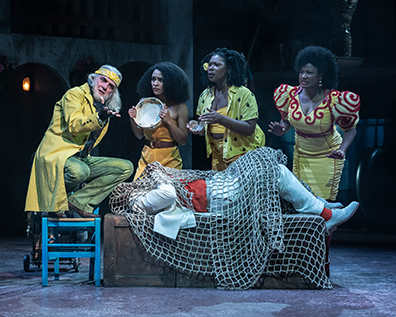
Dr. Pinch (Eric Hissom, left) ministers to Antipholus of Ephesus (Ralph Adriel Johnson, center—in the netting), diagnosed as being possessed by the devil, in the Shakespeare Theatre Company's production of William Shakespeare's The Comedy of Errors. Watching and assisting are, from left, Antipholus's wife Adriana (Shayvawn Webster), her sister Luciana (Cloteal L. Horne), and Thaisa the courtesan (Kimberly Dodson). Photo by Teresa Castracane Photography.
Such is the all-in talent of this ensemble. Most representative is Hissom, a leading star in the DC theater scene. Using little comic touches so central to his character-building skills, Hissom's portrayal of Duke Solinus is sublime, showing empathy for Egeon though politically stuck in a law he issued as part of Ephesus's trade rivalry with Syracuse. This Solinus pays intense attention to Egeon's expository tale, which is played out in tableaux behind a screen, the birthing of the two pairs of twins portrayed by hand-held lamps magically lighting. While the tableaux helps along Egeon's long speech, it is Hissom's subtle gestures and expressions that set the comic tone for the play to come. His brief appearances as a guitar-playing townsperson also earns laughs, but it is his Dr. Pinch that achieves yet another indelible stage moment for this actor. I've now seen Pinch portrayed 24 different ways: Hissom's version will forever stand out for its grand scope of exacting details.
Wearing hip-hugger green jeans, black leather biker vest, yellow long coat, yellow headband, and black fingerless gloves, Pinch has a carry-on baggage of devices for curing the possessed "man and master" as he has diagnosed the Ephesian Dromio and Antipholis. These include bang snaps that he throws on the ground, a large pepper grinder for peppering his patient, a plunger (we don't see how he planned to apply that), an aerosol can he uses for himself to attain an instant high, and a large pair of pincers apparently intended for Antipholus's shapeless crotch. Oh, and a wooden cross, too.
The ensemble also comprises versatile musicians playing a soundtrack composed by Michael Bruce. Jacob Brandt as Roderigo, merchant friend of Antipholus and executioner of Egeon, plays bass, banjo, and mandolin; Rhein plays mandolin, accordion, violin, and melodica organ; Hissom plays guitar, piano, and flute; Linares does percussion with tambourine and a cymbal/snare drum combo; and Paige Rammelkamp (Marina, a makeover of Shakespeare's kitchen wench, Nell) plays piano, saxophone, and a cymbal with a spatula—yes, a burger flipper. The musicians are foundational in the opening musical number (coming after the Egeon exposition scene) but also serve as buskers in the number's purpose of establishing Ephesus as a friendly, fun-loving place.
And they add comic touches throughout the play. When Angela emerges from her shop to give Antipholus his gold chain (purposed for the Ephesian but given to the Syracusan), the other musicians are in her shop providing harmonic voices-from-heaven echoes to Angela's speech. "Lo, here is the chain," she offers to Antipholus. "Chaaaiiiinnn" the chorale sings. Antipholus protests that he "bespoke it not." "Not once, nor twice, but twenty times you have," Angela replies. "That's too many times," the heavenly hosts sing. Antipholus insists on paying for the chain immediately "for fear you ne'er see chain nor money more." Angela shushes him. "You are a merry man, sir: fare you well," she says. "Bye," the singers sing.
The centerpiece actors also bring rich details to their performances. Shakespeare notably portrays two different Antipholi, the Syracusan more easy-going, the Ephesian quicker to anger. In the text and most performances, the Syracusan Antipholus–Dromio relationship somehow seems warmer than that of the Ephesian Antipholus–Dromio relationship. This production offers a fuller understanding of those dynamics: Antipholus of Syracuse comes at the play as a stranger in a strange land whereas Antipholus of Ephesus is a native in what's become a strange land.
Two notable pieces of stage business contribute to this reading. Key to both is that we have watched the Syracusan Antipholus through two extensive scenes interacting with Adriana and Luciana as well as both Dromios. He and his Dromio have been traveling throughout the Mediterranean seeking his brother and has a measure of humility as a result. Throughout these scenes, we learn by report much about Antipholus of Ephesus. This production then does something I don't recall seeing in any other production: The Syracusan Antipholus and and his Ephesian sister-in-law Luciana have an instant attraction for each other on their first meeting. Something in the way he looks at her, perhaps, strikes Horne's Luciana. Then, as soon as they are ensconced in the Phoenix, Johnson makes his initial entrance as the Ephesian Antipholus in the manner of the delayed star of the play, which he kind of is. He is, after all, Antipholus of Ephesus, an established man of stature and popularity in this town. He has a measure of arrogance as a result.
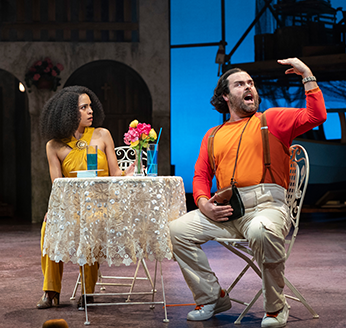
Dromio of Ephesus describes his meeting with Antipholus of Syracuse on the mart thinking it was his master, Antipholus of Ephesus, in the Shakespeare Theatre Company's production of William Shakespeare's Comedy of Errors. From left are Adriana (Shayvawn Webster), Dromio of Ephesus (David Fynn), and Antipholus of Syracuse (Fynn's left hand). Photo by Teresa Castracane Photography.
Meanwhile, Shakespeare writes the Dromios as interchangeable characters. This production gets much mileage out of that in making them identical twins in spirit as well as in appearance. They share the same mannerisms, including a beautiful sketch at the end in which they simultaneously use the exact same mannerisms and gestures. Fynn gets extra mileage with his skills in hand puppetry as his Ephesian Dromio describes to Adriana and Luciana what happened on the mart when he met his master (actually the Syracusan Antipholus). It's Dromio's "quoth I, quoth he" sketch, and by hand puppetry I mean literally: Dromio turns his hand into a puppet playing Antipholus. I've never seen a hand play a character so sinisterly.
The Dromios' hands are involved in several character-defining moments. In the final scene, as one of the Dromios passes Egeon, they share a choreographed hand greeting like baseball players do after home runs. And watch for the running joke involving high fives. When Antipholus of Ephesus is locked out of his house for lunch, Dromio of Ephesus does a premature victory dance, passing in front of Antipholus, Balthazar, and Angela accepting high fives they never offer. Dromio of Syracuse seeks a high five from his master who, likewise, ignores him, so Dromio gives the high five to himself. However, when fetching the money for the Ephesian Antipholus' bail, the Syracusan Dromio raises his hand as part of his obtuse bell chiming joke. Seeing Dromio's hand outstretched over his head, Adriana jumps to high-five him. She apparently has been conditioned by the Ephesian Dromio, but her gesture takes the Syracusan Dromio by surprise.
Coming out of the intermission, Dromio sings "his favorite tune," according to the bass-playing Roderigo, "The Merry Month of May." Whereupon both Dromios sing the song while engaging in a choreography of near misses all around the stage, front to back to front, up and down, exasperating the café waitress and frightening Balthazar. Such is the way of Godwin's approach to Shakespeare: not as purist, but singularly Shakespearean.Eric Minton
September 17, 2024
Comment: e-mail editorial@shakespeareances.com
Start a discussion in the Bardroom



